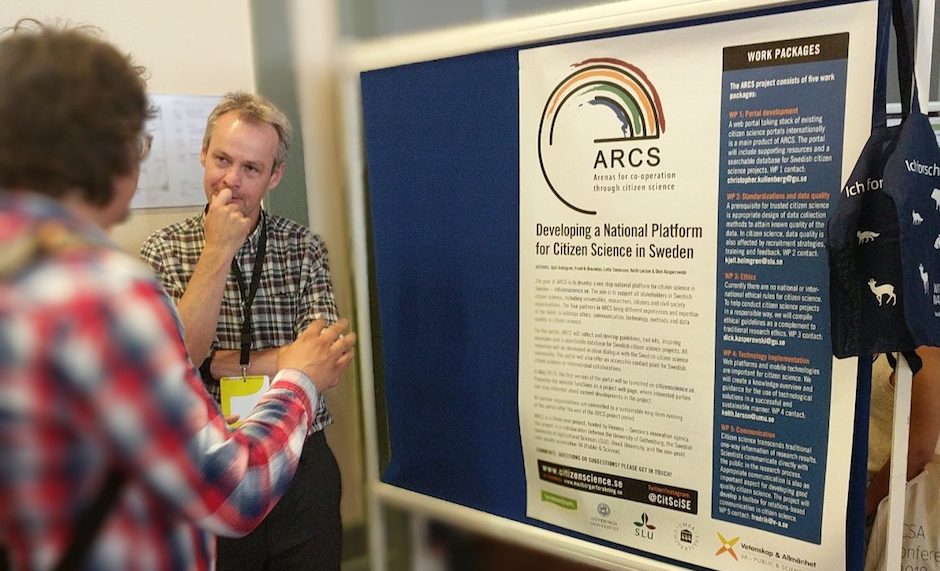The second international conference of the European Citizen Science Association (ECSA) was held in Geneva, Switzerland, on 4–5 June 2018. VA’s Fredrik Brounéus and Dick Kasperowski from the University of Gothenburg gained inspiration for their current work building a Swedish national portal for citizen science. And, as often with conferences, they returned home with more questions than answers.

Around 400 participants – including researchers, activists, practitioners, policy makers – had gathered in a hot and humid Geneva to attend the second international ECSA conference. The theme of the conference was The Citizen.
From VA, Fredrik Brounéus presented the ForskarFredag mass experiment of 2017 – The News Evaluator, in which nearly six thousand Swedish pupils helped researchers explore what news young people are exposed to in their digital newsfeeds, and how credible the news is.
A poster on the Swedish collaboration project ARCS (ARenas for cooperation through Citizen Science), was presented by plant ecologist and project member Kjell Bolmgren, and received a lot of attention. The aim of ARCS is to build a national portal for citizen science in Sweden. The project is coordinated by the University of Gothenburg and includes VA, Umea University and the Swedish University for Agricultural Sciences. From the ARCS-project, Dick Kasperowski also led a workshop on national initiatives for facilitating citizen science. The question posed in the workshop was: Who is the citizen constructed in national initiatives? Are there national or cultural traits?
The ECSA conference was preceded by a two-day workshop which explored the relationship between science, expertise, and civil society. Here, an international gathering of researchers from several fields and countries addressed public participation in the production of scientific knowledge as a form of civic and political dissent. Christopher Kullenberg, ARCS-member from the University of Gothenburg, participated with a paper on “The Politics of Data in the Intersection Between Hacker Culture and Citizen Science.”
During recent years, international interest in citizen science has burgeoned, with the concept now being a key part of the European Commission’s open science dossier.
During recent years, international interest in citizen science has burgeoned, with the concept now being a key part of the European Commission’s open science dossier. The ECSA conference was certainly brimming with examples of cutting-edge citizen science projects, and novel research exploring aspects of the phenomenon. But fundamental questions were also raised. What is citizen science? Who is the citizen? And will citizen science be able to deliver on the great span of expected benefits in policy rhetoric, such as those formulated by the EU Commission: “efficient and transparent use of public and private science and research funding; better engagement in research, governance and accountability; and bringing European policy making closer to the people whilst basing it on scientific evidence”.
In his keynote address “Citizen Science? Rethinking Science and Public Participation”, Professor Bruno Strasser wondered whether “the three promises of citizen science” (good for science; good for education; good for democracy) would be fulfilled. And whether citizen science would lead to new research questions being asked, or merely the same science performed in a different way.
It was interesting to note that, in spite of “The Citizen” theme, the conference contained very few citizen or bottom-up initiatives. These projects were mainly represented by companies developing technologies for facilitating such initiatives. We could not help but notice that some of the very large platforms for citizen science were not represented at the conference. We also saw very little of citizen science outside the fields of biology and ecology. As there are several very successful projects running in fields like history, literature, art and medicine, we hope that the next ECSA conference will attract a broader representation of researchers and practitioners.
The construction of the history of citizen science, with early practitioners such as Linnaeus, Newton, Boyle, Darwin and others, has lately met with some criticism. According to the critics, these grand men of science were wealthy aristocrats with the means to employ a large cadre of workers; workers that would be made invisible as enablers of the scientific discoveries attributed to their employers. This is illustrative of the fact that whereas citizen science as a concept may be old, the science of citizen science is still comparatively young, with many fundamental questions remaining to be explored. When, where, how and to whom is citizen science beneficial? What issues related to topics such as ethics, data quality, use of technology and communication need to be addressed by citizen science stakeholders? From this perspective a session on ethics would have been a welcome addition to the ECSA conference, not least since the European Union’s General Data Protection Regulation (GDPR) will likely affect many citizen science initiatives.
For citizen science researchers and practitioners, these issues have profound effects on our approach to citizen science. Here, international networks and organisations such as ECSA have an important task in bringing all stakeholders together. Citizen science certainly is a useful tool with many benefits, but it may not be the silver bullet it is sometimes held up to be.
/Fredrik Brounéus, Researcher & Press Officer, VA, and Dick Kasperowski, Associate Professor, Theory of Science, the University of Gothenburg
About ECSA
The European Citizen Science Association (ECSA) was formed in 2013 and currently has over 200 organisational and individual members from over 28 countries inside and outside the European Union. The ECSA international conference is held biannually in different member countries. The inaugural conference took place in Berlin 2016.
